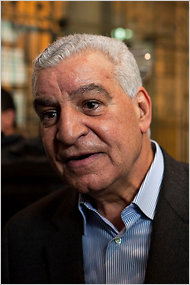As we all know, a revolution is not a dinner party and truth is the first casualty of war.
Both are reasons that make writing about events in Egypt difficult. Yesterday, news emerged that Zaha Hawass had resigned as minister of antiquities, and he confirmed it to The New York Times, among others.
 On the other hand, as a commenter on yesterday’s post about the resignation pointed out, CNN International has a story today, posted shortly after 9 a.m. GMT, which says he had not resigned but “will if asked by new Prime Minister Essam Sharaf.”
On the other hand, as a commenter on yesterday’s post about the resignation pointed out, CNN International has a story today, posted shortly after 9 a.m. GMT, which says he had not resigned but “will if asked by new Prime Minister Essam Sharaf.”
Well, Hawass has always been a complicated, contradictory character, and even if he is out-of-power in Egypt, we’ll be hearing more about him. And from him.
For one thing, he has many enemies, and some are eager to tell their stories about him. Some one has been talking to the website Talking Pyramids, which has been following Hawass’s moves extensively, and today it has a long article, which it describes thusly:
More evidence of internal corruption has come to light in the past few weeks concerning the gift shop and Dr Zahi Hawass’ involvement. Simply put, the opening of the Museum’s new gift shop on the 15th of December last year is in violation of a court verdict.
It is, I warn you, a bit of a tangled tale — and not a short one. It concerns Hawass’s attempts to change the franchise for the bookstore beside the Egyptian Museum leased by Farid Atiya to a gift store operated by the American University in Cairo Press. Visitors to the museum now exit through that gift store.
Despite a court order against the switch, Hawass apparently made it happen. Why? Talking Pyramids has substantiated its story with court documents. Here’s a link to the post.
Of course, there are two sides to every story and we haven’t heard Hawass’s side.
The point, to choose another old maxim, is that fish smells from the head. If Hawass was corrupt, there probably was much more going on underneath him than we know about now.
Photo Credit: Courtesy of The New York Times.
